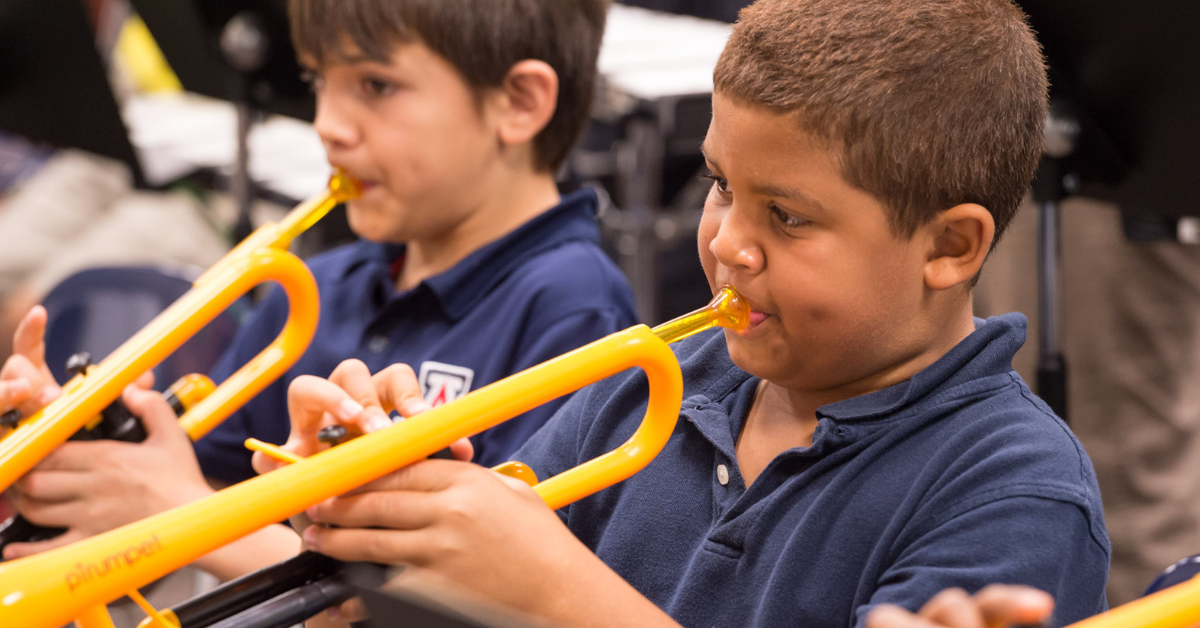Plastic vs. Brass Instruments: What's The Difference?
January 6th, 2023
4 min read

Brass instruments sound great. They look great. But for young learners picking up the first trombone or trumpet, there is often a problem: they are difficult to actually pick up.
Brass is heavy.
For children learning to play their first instrument, weight is a huge consideration. It can cause strain and frustration and ultimately could steer the musicians of tomorrow away from their passion.
How do we know this? Many of our team experienced this first-hand while learning to play brass instruments. While our music journies continued, many others were put off by the bulk of brass.
That’s why we decided to do things differently. We took our brass knowledge and turned the instruments that we played from brass to plastic.
But can a plastic brass instrument sound like its traditional counterpart? What are the advantages? What are the disadvantages? Which type of instrument is the best for your needs?
Let’s take a closer look at the plastic instruments vs brass instruments debate and help you to decide which material is music to your ears.
Cost
Money talks, so let’s get the cost question out of the way. Premium brass instruments can retail for thousands of pounds. But these instruments are designed for experienced musicians and those who play in a professional setting. In other words, the type of people who wouldn’t be on the lookout for a plastic instrument.
These musicians have to start somewhere, which is where we can pitch plastic against brass: brass instruments for beginners.
A typical trumpet for beginners retails at around £175-275. Further costs are added when repairs and spare parts are factored in. Dropping or damaging a brass instrument will require the services of a professional. This is an expensive outlay for premium brass instruments, but for budget, beginner models, repairs are often impossible (or will cost more than the instrument itself).
A plastic model, such as the pTrumpet, retails for £139, without the added worries of costly repairs and servicing. Why? Because plastic instruments are more robust. After all, there’s a reason why generations of children have been trusted with recorders! The pTrumpet’s plastic construction means that maintaining and cleaning your instrument does not need professional care: the mouthpiece can even get the dishwasher treatment! And should repairs be needed for those more extreme accidents, a touch of superglue will usually do the trick.
So for cost, it’s Plastic 1 - 0 Brass.
Sound
Now we’ve discussed money matters, let’s get back to what counts with a musical instrument: sound.
If we are comparing the sound of a trombone from the orchestra pit at a Broadway musical with a beginner plastic instrument, this wouldn’t be a fair fight. Of course, the premium and professional brass instrument is going to play and sound as we would expect: big, brilliant, and brassy. These instruments are made from brass because that’s what professional players demand, and rightly so.
If we are comparing plastic and brass with beginner instruments, this is a much closer-run affair. Many of our team who design and manufacture our instruments have played brass at a professional level. And that has to begin with beginner instruments. As children, those premium models are unlikely to be the first trumpets, trombones, and cornets that are picked up and played. Instead, they use beginner brass instruments.
Our pBone, like all our pInstruments, is designed to sound as close to the original sound of a trombone as possible. Take a listen to the pBone in this video:
Sounds the part right?
It captures the feel and, most importantly, introduces the techniques needed to produce a great sound. This means that learners who get to grips with their plastic instruments can make a seamless transition to bigger brass versions.
Beginner brass instruments can vary in quality. Because an instrument is made of “brass” doesn’t guarantee a good sound. Plastic and brass in this case are tied. That makes it a point for each: Plastic 2 - 1 Brass.
Fun
Brass instruments are fun. We should know: we play them, listen to them (and write lots of gushing compliments about them too!)
Our pInstruments aim to share that feeling of playfulness and excitement. They are easy to pick up and play and they come in a range of bright colours. This allows children to express themselves and bring personality to their playing.
Although brass instruments are lots of fun, our pInstruments add colour to the mix and play just like brass instruments, so we are going to call this round a tie. That makes the scores Plastic 3 - 2 Brass.
Sustainability
Climate change is a pressing concern for us all. So this one should be an easy win for brass. After all, the last thing we need is more plastic, right?
Well, this isn’t strictly true with our range of pInstruments.
For starters, our plastic brass instruments are built to last. These aren’t disposable items that don’t stand the test of time. As already discussed, they are often easier to repair than their budget brass counterparts. But when the time to move on musically does come, our ABS plastic is fully-recyclable.
We also offset all the CO2e we use in our business, including transport and manufacturing. We also offset an additional 10% of our carbon as we work towards being carbon neutral by 2030.
But what about brass? Are brass instruments better for the planet?
Erm. Not quite.
The process of manufacturing brass instruments wastes tonnes and tonnes more CO2e than our pInstruments.
Brass is, fairly obviously, heavier than plastic.
Not only does this make it trickier for little learners to handle, but it also adds to the carbon footprint when transporting brass instruments.
So, surprisingly for some, in sustainability we make that Plastic 4 - 2 Brass.

And the winner is…
A fairly convincing score in our battle of brass vs. plastic. But there are a few important takeaways.
We love brass instruments.
Our team created plastic brass instruments because we love brass instruments. We wanted more learners to fall in love with the trumpet, to take on the trombone, to make a career with their cornet, and to begin their brass journey.
For those starting, our instruments are the perfect introduction. They address the areas that can hamper that early passion, such as cost, simplicity, and engagement.
We also don’t see plastic instruments in opposition to brass. Our scoring system might have seen the plastic variety out in front, but we see our instruments as the smart, sustainable alternative to budget brass.
By learning to play with our pInstruments, children can progress to a premium brass instrument.
The materials we use for our instruments can be important, but what matters is where that sound travels.
If those first melodies on a plastic instrument lead to a career built in brass, it will demonstrate that plastic and brass instruments can truly work together in harmony.
Ready to pick up a pBone? Click here to buy on Amazon. You can also buy our pCornet, pTrumpet, and much more!
Need to hear our instruments in action first? Check out how our pBone and pTrumpet sound next to their brass counterparts in this video.
Still not convinced? If you think plastic instruments are toys then read our blog.
Adam is the Content Manager at pBone Music. This should mean that he’s the ideal person to write about himself, but he finds boasting in the third person a little awkward. He honed his word wizardry with a degree in English Language and Literature at the University of Leeds. He has since written copy for clients and businesses across the land, from awards to something beginning with “z”. He also spent a number of years as a musician. He has written pop songs and even jingles for kids, performed more first dances at weddings than you could shake a pBuzz at, and once played a gig for a pie company at The Etihad Stadium in Manchester. When he’s not reminiscing about those good old days, you might find Adam enjoying the football (although as an Everton fan, that can be difficult). He also loves spending time with his partner, Jen, and his family and friends, and sincerely hopes they feel the same way.
Topics: